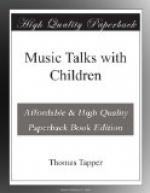In our next Talk we shall learn that pure thought, written out of the heart, is forever a good in the world. From this we shall learn that to study music rightly is to cultivate in our own hearts the same good thought which the composer had. Hence the third reason we can find for studying music is that it makes us able to help and to cheer others, to help them by willingly imparting the little knowledge we have, and to cheer them by playing the beautiful thoughts in tone which we have learned.
These are three great reasons, truly, but there are many others. Let us speak about one of them. In some of the Talks we are to have we shall learn that true music comes from a true heart; and that great music—that is the classics—is the thought of men who are pure and noble, learned in the way to write, and anxious never to write anything but the best. There is plainly a great deal of good to us if we study daily the music of men such as these. In this way we are brought in touch with the greatest thought. This constant presence and influence will mold our thoughts to greater strength and greater beauty. When we read the history of music, we shall see that the greatest composers have always been willing to study in their first days the master works of their time. They have strengthened their thoughts by contact with thoughts stronger than their own, and we may gain in just the same way if we will. We know now that there are many reasons why it is good for us to study music. We have spoken particularly of four of these. They are:
First, for the happiness it will give us.
Second, for the order it demands of us.
Third, for the power it gives us to help and cheer others.
Fourth, for the great and pure thought it brings before us and raises in us.
All these things, are they true, you ask? If the little child had asked that of the master he would have said:
“These things shalt thou find real because they make thee brave. And the pain and the drudgery and the hot tears shall be the easier to bear for this knowledge, which should be strong within thee as a pure faith.”
CHAPTER III.
MUSIC IN THE HEART.
“Raffaello’s genius goes directly
to the heart.”—Autobiography of
Benvenuto Cellini.[4]
The only true way to learn is by doing. The skill of the hand and the skill of the thought can be brought out only by use. We shall not become very skilful, nor very learned, nor very good unless we daily devote ourselves to tasks—often difficult and unpleasant—which shall bring to us wisdom, or success, or goodness. None of these things, nor any other like them, come merely by talking about them. That is the worst way of all—merely to talk and not to act. But if we talk truthfully and act with care, we shall gain a great deal. Pleasant companionship often brings forth thoughts which if we follow them industriously, lead a long way in a good direction.




